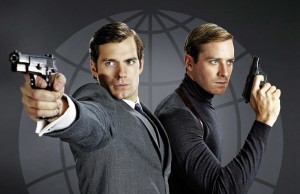The Man from U.N.C.L.E.
Starring: Henry Cavill, Armie Hammer, Alicia Vikander, Elizabeth Debicki, Hugh Grant
Directed By: Guy Ritchie
Reviewed by Brendan Dousi
[rating: 3.5/5]
I don’t know about anyone else, but I’ve recently noticed that in the last few years cinema, the look in particular, is becoming homogenized. It could have something to do with the increase in big super blockbusters, the rise in superhero films and the fact that Marvel/Disney insists on recruiting television directors to make their films look as clean and simple as possible, but everything is starting to look rather ‘samey’ (It’s a scientific term, I promise). So it’s becoming increasingly special when a new film, especially a potential Hollywood blockbuster, comes along that actually looks different. Enter Guy Ritchie’s The Man from U.N.C.L.E.. From the trailers we could see that this film had a unique, deliberate aesthetic and our experience of Ritchie only backs up this fact. The only problem is, will this film actually be good enough to justify the studios to branch out a bit more with their aesthetic and visual style, or will the film flop and doom us to a life of cinematic visual mundaneness?
When charismatic womanizer, former super-thief and current CIA agent Napoleon Solo (Henry Cavill) is sent on a dangerous mission to rescue Gaby (Alicia Vikander), the daughter of a kidnapped ex-Nazi nuclear scientist, the last thing he expected was to meet his match in the form of a crazed Russian meat-tank named Ilya Kuryakin (Armie Hammer). After coming to blows and butting heads more than once, it becomes apparent that both governments and agents are after the same thing, to stop the glamorous Nazi terrorist Victoria (Elizabeth Debicki) from blowing away half the world with a nuclear warhead. Ilya and Solo are ordered to join forces, use Gaby as bait and try to put their egos aside long enough to divert nuclear catastrophe.
From a story perspective The Man from U.N.C.L.E. isn’t anything particularly special. It’s all quite straight forward spy-genre stuff really. There are a couple of twists and turns but nothing truly surprising with everything playing out almost exactly how you would expect it to. In the end though, this isn’t really important. This film isn’t trying to reinvent the genre. It’s a love-letter to it. From the aesthetics to the tone and even the slightly-hammy performances this film screams ‘classic spy film’ and it ends up being a really enjoyable romp. There’s a level of humour here that, coupled with some truly great action set-pieces, really set this film apart. It really does aspire to be like the spy-action adventures of old and it succeeds tremendously.
Unfortunately, while it succeeds in emulating those old spy films, it also falls into their short-comings. In particular is the representation of the female characters. We had a female villain, and that’s fine, Elizabeth Debicki did a fantastically dastardly job, but she was little more than a glamorous two-dimensional caricature. The worst offender, however, is the character of Gaby played by Alicia Vikander. The film goes out of its way, particularly at the end, to try and convince the audience that Gaby is an important part of the ‘U.N.C.L.E.’ team but at the end of the day she is only there to drive the plot forward. Little else is done with her that isn’t completely circumstantial. They even go as far as to reveal that she’s an impressive fighter, able to take on Ilya who is a well accomplished martial-artist, but that set-up leads absolutely nowhere. It really does come across like Ritchie doesn’t know what to do with his female characters. It isn’t a deal-breaker, that’s for sure; it’s just a disappointment that such a promising film has such a glaringly obvious short-coming.
Despite all of this, the most overwhelmingly impressive thing about this film is it’s beautifully lush aesthetic. Ritchie has decided here to take the film set in the 60s and absolutely run with it. From the wonderful set design, the beautiful cars and the delightful fashion, you truly feel like you’ve been transported back to another decade. Even the colour-grading on the film emanates the films of that era. Beyond this are the performances, which have a distinct hammy-ness to them that would not be out of place in a 60s spy film. I know ‘hammy’ is usually a bad sign when describing acting but it works here, it really does.
While it may not be unique and it certainly has its flaws, The Man from U.N.C.L.E. is still a delightful love letter to the spy films of yesteryear from its beautiful 60s aesthetic down to its humorous script, for better or for worse. If you’re after a film with a rich atmosphere, fun characters and a unique look and style that differs from the usual blandness, The Man from U.N.C.L.E. is definitely worth the price of admission.




